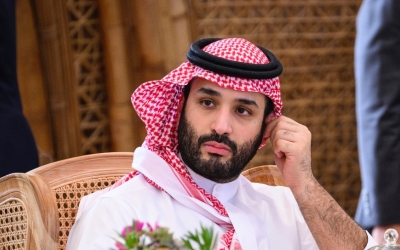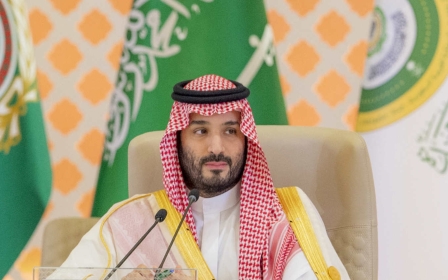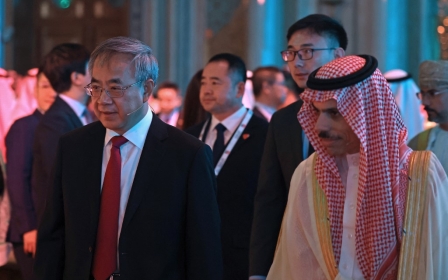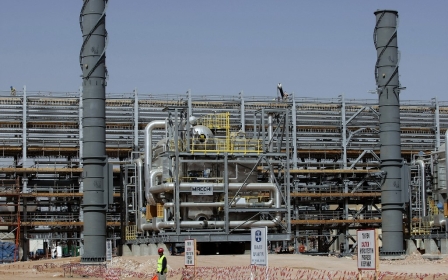Saudi Arabia's oil policy hits fears of global economic slowdown

Oil prices came under fresh pressure Monday, underscoring how Saudi Arabia’s efforts to prop up crude face an uphill battle in the face of higher-than-expected Russian production and fears about the health of the global economy.
“We are working against something called uncertainties and sentiments," Saudi Arabia's Energy Minister Prince Abdulaziz bin Salman said Sunday, at an Arab-China business conference in Riyadh.
The price of Brent crude, the international benchmark, was down 2.77 percent Monday morning EST to $72.72 per barrel, amid worries about a possible recession in the United States and China's weaker-than-expected post-Covid economic recovery.
The drop came even after Saudi Arabia's surprise decision in June to cut output by one million barrels a day next month, in a bid to lift prices that Abdulaziz called a “Saudi lollipop”.
But bets against the price of oil are proving resistant to the Saudi cuts. On Sunday, Goldman Sachs made its third downward revision for Brent in six months, bringing its forecast for December prices down to $86 a barrel from $95. Goldman analysts have been more bullish on oil prices.
Abdulaziz has gained a reputation for lashing out against traders betting on a decline in oil prices. He warned speculators they would be “ouching like hell” if they doubted his willingness to support prices and in June told them to “watch out” ahead of an Opec+ meeting.
Saudi Arabia has been at the forefront of pushing members of Opec+, a group of oil producers led by Saudi Arabia and Russia, to cut production. Despite two production cuts in eight months, oil prices have sunk 40 percent from May 2022 highs of $125 a barrel to around $75.
Saudi Arabia has used the recent windfall in oil revenue to plough ahead with megaprojects designed to diversify the kingdom’s economy away from fossil fuels.
According to the IMF, Saudi Arabia needs an oil price above $80 a barrel to balance its budget and see through projects like the $500bn megacity Neom and a new airline. Analysts believe Abdulaziz is under pressure from his half-brother, Crown Prince Mohammed bin Salman, to raise prices.
Putin and crown prince talk
The downward trend in prices comes as The International Energy Agency warns that the Saudi-led cuts could worsen a global oil deficit, driving inflation higher. But Saudi Arabia is walking a fine line. Cutting too much could lead to higher prices when the global economy is weak, creating a downward spiral in demand.
At the same time, Saudi Arabia gave up market share in June when it slashed 10 percent of its total oil output. But the drop in crude prices means the kingdom hasn't been able to make up for the loss in revenue. Soaring production in Russia is also complicating Saudi Arabia's efforts to maintain tight supply.
Because of western sanctions over the war in Ukraine, Russia is selling crude at a steep discount. To compensate for below-market prices, Moscow is flooding the market. According to data compiled by Bloomberg, Russia’s crude exports were within 100,000 barrels a day of a record in the four weeks to 4 June.
Last week, Russian President Vladimir Putin and Saudi Crown Prince Mohammed bin Salman held a phone call praising their cooperation in Opec+ amid reports of fissures between Riyadh and Moscow over oil production.
According to the Kremlin, the two leaders discussed “in detail” how to ensure stability in world energy markets.
"Both sides praised cooperation within the framework of Opec+ allowing for the adoption of timely and effective steps to ensure balance between supply and demand for oil,” the Kremlin statement added.
Middle East Eye propose une couverture et une analyse indépendantes et incomparables du Moyen-Orient, de l’Afrique du Nord et d’autres régions du monde. Pour en savoir plus sur la reprise de ce contenu et les frais qui s’appliquent, veuillez remplir ce formulaire [en anglais]. Pour en savoir plus sur MEE, cliquez ici [en anglais].





